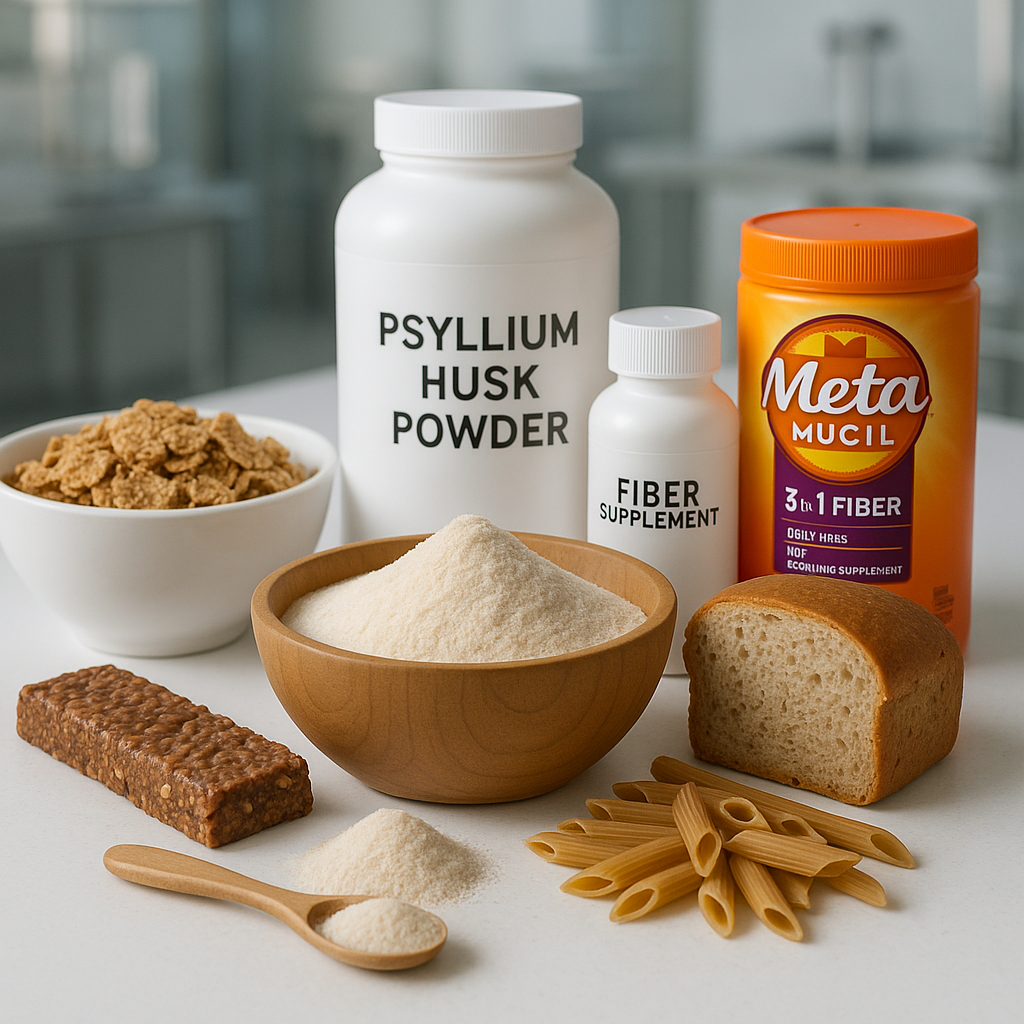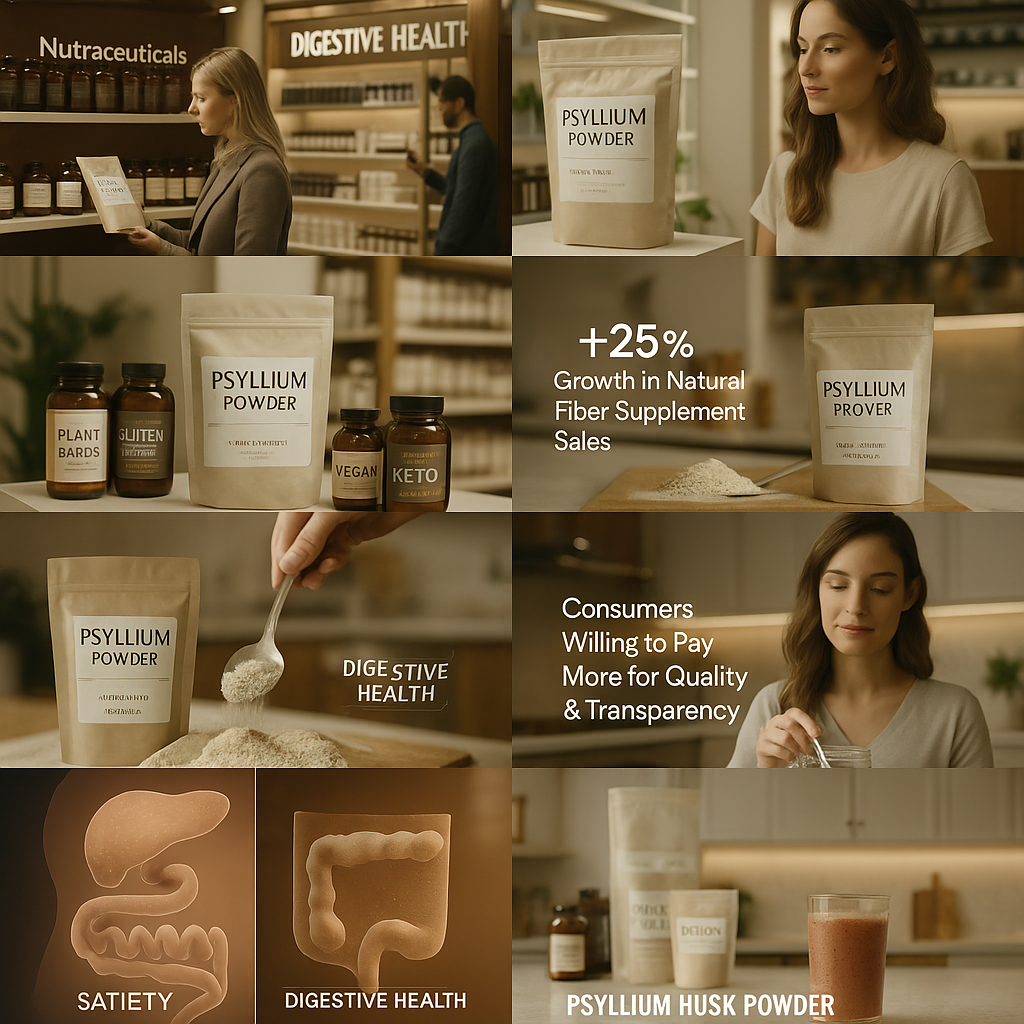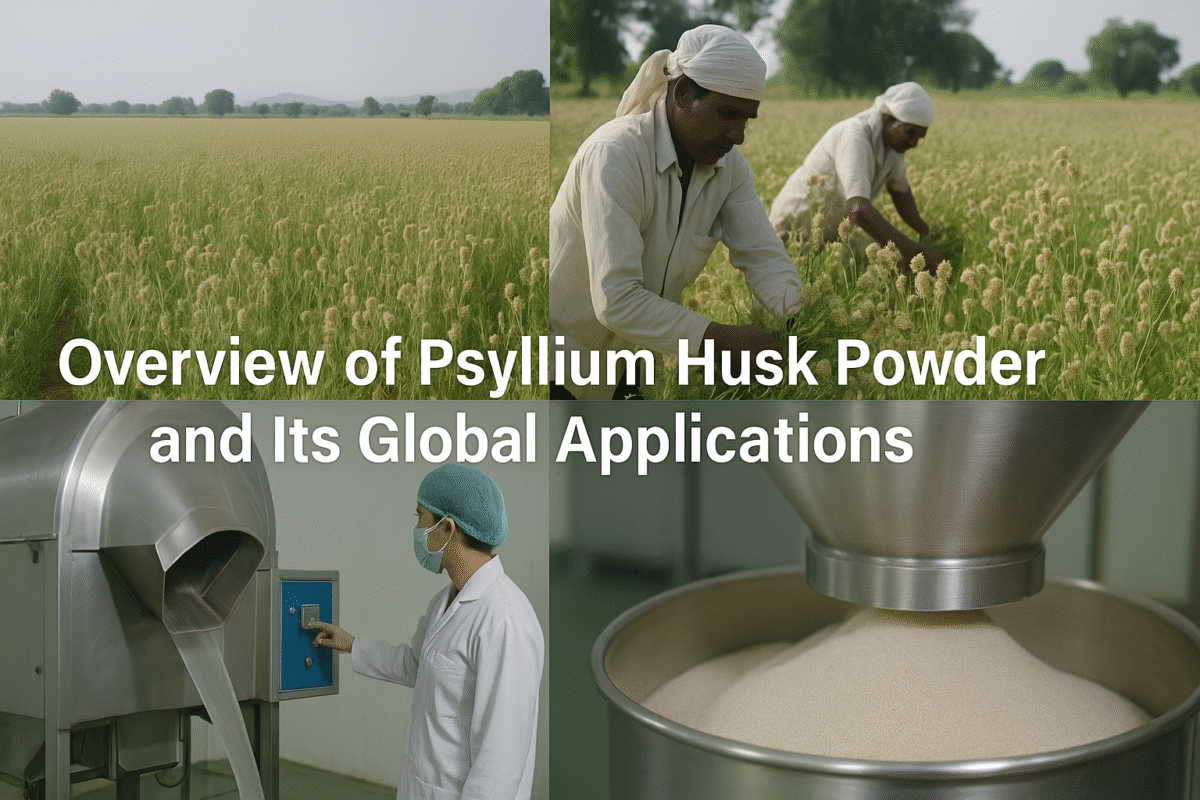Table of Contents
Psyllium husk powder, derived from the seeds of the Plantago ovata plant, has become an integral component in a variety of industries worldwide. This natural fiber source has gained recognition for its numerous health benefits, especially in promoting digestive health and regulating bowel movements. In its raw form, psyllium husk is a fibrous substance, but it is ground into powder to make it easier to incorporate into various products, particularly dietary supplements, food items, and pharmaceutical formulations.
Globally, psyllium husk powder is predominantly used in the health, food, and pharma sectors. In the health sector, it is commonly found in fiber supplements that help to treat constipation and improve overall gut health. Its ability to absorb water and form a gel-like consistency makes it highly effective in addressing digestive issues. In the food industry, psyllium is utilized in gluten-free, low-carb, and high-fiber food products such as bread, cereals, crackers, and protein bars. It also appears in functional beverages, where it enhances the product’s fiber content.
In the pharmaceutical industry, psyllium husk powder is an essential ingredient in bulk-forming laxatives and other digestive health products. The versatility of psyllium powder, combined with its proven benefits, has led to its widespread use in various applications. As more consumers globally turn to natural alternatives to synthetic drugs and processed foods, psyllium husk powder is experiencing substantial growth in demand, particularly in developed markets like the USA and Europe.
Health-Conscious Consumer Base Driving Demand
A major factor driving the demand for psyllium husk powder in the USA and Europe is the increasing awareness of the importance of gut health and fiber intake. Over the past decade, health-conscious consumers have become more mindful of the foods they consume, especially when it comes to digestive health and the role that fiber plays in maintaining a healthy gut. Both in the USA and Europe, fiber deficiency has become a widespread concern, with many people failing to consume the recommended daily intake. As a result, the popularity of dietary fiber supplements, including psyllium husk powder, has skyrocketed.
In addition to digestive health, psyllium is also recognized for its potential to aid in weight management.

As the number of individuals adopting weight-conscious and wellness-driven lifestyles continues to grow, psyllium’s ability to promote satiety and support healthy weight loss has made it a popular choice for those seeking natural weight management solutions. Furthermore, the rise of chronic diseases such as diabetes and obesity in both the USA and Europe has spurred a greater focus on healthy eating and the prevention of such conditions. Psyllium, being a natural fiber, fits perfectly into this paradigm, offering a safe and effective way to support overall health and well-being.
The consumer base in both regions is also shifting toward natural, plant-based products. Psyllium’s organic origins and minimal processing make it an attractive option for individuals who prefer natural supplements over synthetic alternatives. This trend is particularly evident in the growing demand for clean-label products, where transparency in ingredient sourcing and manufacturing processes is highly valued. As people become more conscious of the long-term impacts of their dietary choices, psyllium husk powder is rapidly becoming a staple in their wellness routines.
Psyllium as a Functional Ingredient in Dietary and Nutraceutical Products
In the dietary and nutraceutical industries, psyllium husk powder has carved a niche as a functional ingredient that enhances the fiber content of various products. One of the most common applications of psyllium is in fiber supplements, where it is used to treat constipation and promote overall digestive health. Psyllium is a bulk-forming laxative, meaning that it absorbs water in the intestines, helping to soften stools and make them easier to pass. This makes psyllium an essential component in many over-the-counter remedies for constipation.
In addition to its use in fiber supplements, psyllium is also a key ingredient in detox products. Many detox diets and cleanse programs feature psyllium as it helps to eliminate toxins from the body by promoting regular bowel movements. Moreover, psyllium is frequently included in colon health formulas due to its ability to support a healthy colon by promoting regular digestion and preventing constipation.
Psyllium is also gaining popularity in gluten-free foods, which have become a staple in many Western diets due to increasing awareness of celiac disease and gluten sensitivity. Gluten-free breads, cakes, and crackers often use psyllium to improve texture and provide structure, as it mimics the effects of gluten without the associated risks for individuals with gluten intolerance. Furthermore, psyllium has become a valuable addition to many keto products, offering a low-carb source of fiber that is essential for maintaining digestive health on a ketogenic diet.
The increasing demand for nutraceuticals and functional foods in the USA and Europe has made psyllium an indispensable ingredient. As the consumer base becomes more focused on holistic health and natural wellness, the inclusion of psyllium in a variety of health-focused products continues to expand.
Regulatory Approval and Safety Recognition in Western Markets
Psyllium husk powder is regulated by several authorities in both the USA and Europe, which helps to ensure its safety and efficacy in food and pharmaceutical products. In the USA, the Food and Drug Administration (FDA) plays a key role in overseeing the use of psyllium in dietary supplements and food products. Psyllium is generally recognized as safe (GRAS) when used according to recommended dosages, and its inclusion in fiber supplements is backed by scientific evidence supporting its benefits for digestive health. The FDA’s approval provides reassurance to consumers and manufacturers alike, ensuring that psyllium-based products are safe for consumption.
In Europe, the European Food Safety Authority (EFSA) also recognizes psyllium as a safe and beneficial ingredient in food products, particularly in the context of digestive health. The approval process by EFSA includes rigorous scientific evaluations to ensure the safety of psyllium in food products, which in turn boosts consumer confidence. As more companies in the USA and Europe incorporate psyllium into their product formulations, these regulatory approvals serve to reinforce the credibility and trustworthiness of psyllium-based products.
The recognition and approval by these regulatory bodies make psyllium a highly trusted ingredient in Western markets. Both the FDA and EFSA’s regulations ensure that the products consumers are purchasing contain high-quality psyllium that is free from contaminants and meets safety standards, ultimately increasing the likelihood of continued growth in demand for psyllium husk powder in these regions.
Boom in Vegan, Keto, and Clean-Label Food Trends
The rise of vegan, keto, and clean-label food trends has further solidified psyllium husk powder’s place in the food industry. As consumers shift toward plant-based diets, they seek ingredients that align with their values of sustainability, health, and ethical food production. Psyllium, being a plant-derived fiber, fits perfectly within the vegan food sector, providing a natural, non-animal-sourced fiber alternative to traditional ingredients like gluten or dairy.
The keto diet, which focuses on low-carbohydrate, high-fat foods, has also driven the demand for psyllium. As keto followers strive to maintain digestive health on a low-carb diet, psyllium’s high fiber content offers an essential solution. Psyllium is often used in keto-friendly baking and snack products, where it enhances texture and provides bulk without contributing to the carb count.
Clean-label foods, which emphasize transparency and minimal ingredient processing, are another area where psyllium is in high demand. As consumers seek food products with fewer additives and chemicals, psyllium serves as a natural, high-quality ingredient that meets the demand for simpler, more wholesome products. Psyllium’s versatility as a fiber enhancer, thickener, and binder makes it an ideal choice for manufacturers looking to meet the clean-label movement in both the USA and Europe.
Advanced Food and Pharma Industries Supporting Large-Scale Demand

The large-scale demand for psyllium husk powder is largely driven by its widespread use in both the food and pharmaceutical industries. In the food industry, psyllium is primarily utilized in the formulation of fiber-rich foods such as cereals, protein bars, baked goods, and snack foods. Its ability to act as a bulking agent and binder makes it ideal for gluten-free and low-carb products, which are increasingly popular in Western markets. For example, psyllium husk powder is a key ingredient in many gluten-free bread and pasta formulations, helping to mimic the elasticity and structure typically provided by gluten.
In the pharmaceutical industry, psyllium is a staple in the production of bulk-forming laxatives, where it serves to alleviate constipation by absorbing water and forming a gel-like mass that helps ease stool passage.
Popular over-the-counter brands like Metamucil rely heavily on psyllium as their active ingredient, making it a critical component of digestive health solutions. Its effectiveness and natural origin also contribute to the growing preference for psyllium-based products in both the food and pharmaceutical industries.
In addition to these, psyllium husk powder plays a role in the creation of functional beverages and dietary supplements aimed at improving overall gut health. This includes detox drinks, colon health supplements, and other nutraceuticals. As consumers continue to focus on health and wellness, the food and pharma industries in both the USA and Europe are increasingly turning to psyllium to meet the demand for natural, high-quality ingredients that support digestive and overall health.
Strong Import Infrastructure and Trade Ties with India
One of the reasons the USA and Europe are leading importers of psyllium husk powder is the established trade relationship with India, which is the world’s largest producer and exporter of psyllium. India is responsible for over 80% of global psyllium production, and it has built a robust export infrastructure to meet the growing demand for psyllium products in Western markets. This makes India the key player in supplying psyllium husk powder to countries like the USA and Europe.
India’s psyllium export industry is supported by well-established supply chains that ensure the timely and consistent delivery of high-quality psyllium products to global markets. The Indian suppliers have optimized the harvesting, processing, and packaging of psyllium to meet the quality standards required by the USA and Europe. Moreover, the export logistics infrastructure in India, including ports and shipping routes, facilitates the smooth movement of psyllium products to these regions.
India’s dominance in the psyllium market is not just based on its large-scale production capabilities but also on its capacity to meet the regulatory requirements of international markets. Indian psyllium exporters comply with the standards set by regulatory bodies like the FDA (USA) and EFSA (Europe), which ensures that the psyllium products imported into these regions are safe and of high quality.
The ongoing collaboration between Indian suppliers and Western manufacturers has cemented India’s role as a reliable source of psyllium husk powder, further solidifying its importance in the global supply chain.
Higher Purchasing Power and Premium Health Product Markets
The USA and Europe are also key markets for psyllium husk powder because of the higher purchasing power of consumers in these regions and their demand for premium health products. In both regions, consumers are willing to spend more on natural and high-quality products that promote health and wellness. As health awareness continues to grow, especially in the context of digestive health, the demand for fiber-rich, natural supplements like psyllium is increasing.
Consumers in the USA and Europe are not only looking for products that support gut health, but also those that cater to specialized dietary preferences, such as vegan, gluten-free, or low-carb products. Psyllium husk powder’s versatility and natural origins make it an attractive ingredient for these consumers.

The premium health product market in these regions is thriving, with psyllium used in a wide range of high-end supplements, functional foods, and nutraceuticals.
In addition to digestive health, psyllium is increasingly being used in weight management products. Its ability to promote feelings of fullness and aid in digestion has led to its inclusion in many weight loss and detox programs. Given the higher disposable income in both the USA and Europe, consumers are more likely to invest in these premium health products, driving the demand for psyllium in these markets.
Sustainability and Organic Certifications Driving Psyllium Preference
In addition to its health benefits, another reason psyllium husk powder is so popular in the USA and Europe is the increasing demand for sustainably produced, organic products. Many consumers are actively seeking products that are not only good for their health but also better for the environment. Psyllium, particularly when grown organically, fits this growing consumer preference.
Organic certifications, such as those from the USDA (USA) and the EU Organic certification (Europe), ensure that psyllium is grown without the use of harmful chemicals, pesticides, or synthetic fertilizers. This makes organic psyllium particularly appealing to environmentally-conscious consumers who prioritize sustainability in their purchasing decisions. Furthermore, psyllium’s ability to thrive in arid climates makes it a sustainable crop that can contribute to soil conservation by preventing erosion.
The increasing preference for non-GMO, organic, and eco-friendly products in both the USA and Europe is driving demand for sustainably sourced psyllium. As more consumers look to reduce their ecological footprint, the demand for organic psyllium husk powder is expected to continue growing, particularly among those who seek clean-label products that are free from artificial additives and preservatives.
Market Forecast and Growth Opportunities in These Regions
The market for psyllium husk powder in the USA and Europe is experiencing steady growth, with projections indicating that this trend will continue in the coming years. In the USA, the increasing focus on gut health, weight management, and the preference for natural products are contributing to the growth of the psyllium market. Similarly, in Europe, the demand for functional foods and dietary supplements that promote digestive health is fueling the rise of psyllium-based products.
According to market research, the global psyllium market is expected to grow at a healthy rate in the next five to ten years, with the USA and Europe continuing to be the largest consumers. The USA is particularly strong in terms of dietary fiber supplement consumption, where psyllium is one of the leading ingredients in many products. In Europe, the growing awareness of the benefits of fiber and clean-label products is driving the demand for psyllium, with countries like Germany, the UK, and France leading the charge.
India’s role as a dominant supplier of psyllium will remain critical to the continued growth of this market. As the demand for psyllium-based products increases in both regions, there will be more opportunities for Indian exporters to expand their reach and for Western manufacturers to tap into this growing market by incorporating psyllium into their formulations.
Given the growing health-conscious consumer base, advancements in the food and pharma industries, and the strong trade ties between India and the USA/Europe, the psyllium market in these regions holds significant growth potential. With increasing investments in research and development, new product innovations, and an ongoing push for sustainability, the future looks bright for the psyllium husk powder market in the USA and Europe.



